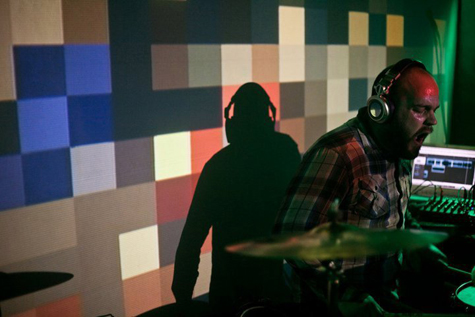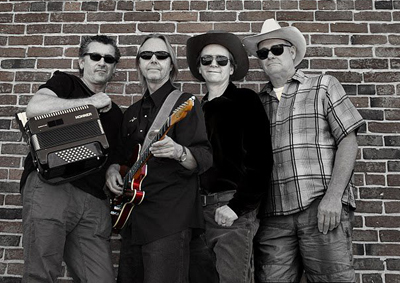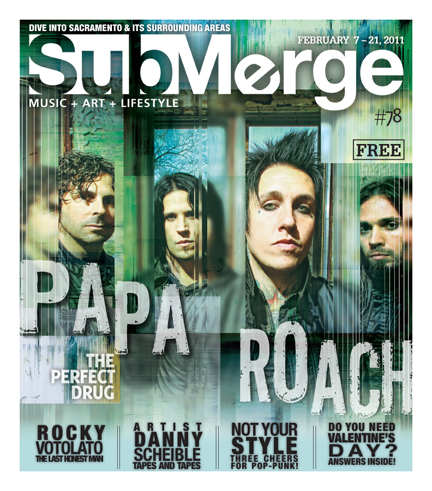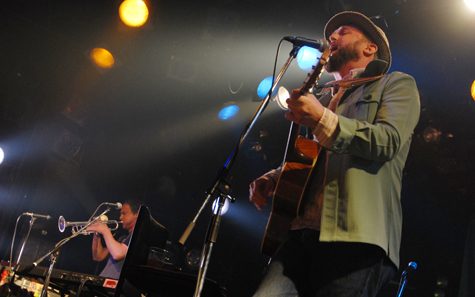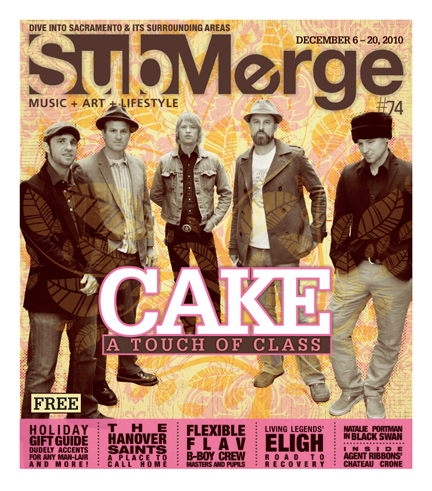Ira Skinner’s solo project, Paper Pistols, which consists of Skinner playing live drums over programmed music he composes, is soon to release a new five-track EP which will more than likely be self-titled, the drummer/programmer/recording engineer recently told Submerge. “The recording process has been slow,” he said. “Although I own a recording studio, I don’t find much time to work on my own music. I plan on dedicating one day a week to my own music and finally finishing [the EP].” Skinner said the songs are mostly older ones that he’s recorded before but wasn’t satisfied with. “All my previous sessions have been recorded all over the West Coast in various studios,” he said. “Something about the previous recordings sounds unfinished to me.” Skinner has played with some of Sacramento’s most beloved bands over the years (one being the Evening Episode); he currently plays drums in Pets (though he isn’t a full-time, official member), another local favorite. When asked if he ever gets lonely now that he doesn’t have a band to call his own, he responded, “Absolutely. I really miss the Evening Episode members. That band was full of people throughout the years that I could really trust musically,” he said. “It is nice being on my own, though. I don’t have to show up to practice or balance anybody’s schedule. Also, nobody’s there to turn down a song. My band thinks everything I do is great.” Find Paper Pistols on Facebook to sample a couple tracks and to keep an eye out for the EP release date.
Tag Archives: Sacramento band
Paper Pistols will have new five-track EP out soon
Bob Woods Band CD Release & Video Shoot on March 12 at Marilyn’s on K
Bob Woods Band CD Release/Video Shoot
Sacramento musician Bob Woods goes way back. He started playing music in 1971 with the Sacramento Western swing band Tokpela. He then went on to form the Nevada City club favorite band the Bob Woods Trio. He’s played with a slew of notable cats, including Tiny Moore, Bill Kirchen and Ramblin’ Jack Elliott, among others. Now, his current four-piece band (Woods on guitar and vocals, Pete Kmeto on bass and accordion, Steve Namie on drums and Ray Elzey on pedal steel), is readying their full-length, This Town, for release on March 12, 2011 at Marilyn’s on K. The group will also be shooting a music video that night, so bring your dancin’ shoes and your best moves, and you just might end up in the final cut. Also performing will be Nothin’ Personal and Dirt Nap Band. Doors open at 7 p.m. and tickets are just $10 at the door. If you RSVP ahead of time, you’ll save yourself five bucks. Call (916) 524-9671.
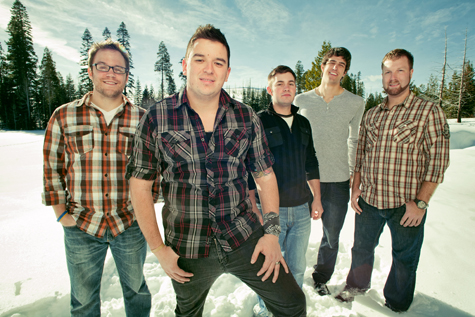
It Ain’t Over ‘Til It’s Over
Sacramento’s Not Your Style to Release Pop-Punk Debut In Season
Make no mistake about it: pop-punk as a revolutionary genre of music is quite dead. Even as a marketable way to sell skate decks, or dunks, or hair gel, it’s a goddamn apparition. But–and this is a big but–this is not to say that there aren’t times when you can relish in the finer glimmers in the flashes in the pan. Most everyone who digs pop music can appreciate the hook-y sensibility and heart-wrenching gloom of an old Saves the Day record, or a (A) New Found Glory EP. Where was I the first time I heard Blink 182’s Cheshire Cat? On Airport Road in Redding, Calif., after school on the way to Circuit City. See how that works? Those who experienced Lagwagon can’t tell fans of Panic! At the Disco about it and expect them to listen; just like those who wiggled to the spastic skate-punk of Descendents couldn’t expect Lagwagon disciples to “know” what it “really meant to rock!”
It’s for the reasons above that Not Your Style’s relatively tardy arrival to the pop-punk canon can be dismissed. Because inside all the premeditated naysaying hard-wired into critics who are interested in moving past frigid forms of expression, there lies that concession that every take is a new scene.
Not Your Style is resurrecting sunny melodies in Sacramento, and back-dropping them with crunchy riffs, four-on-the-floor rock drumming and saccharine-sweet lyrical imagery. It’s a formula that vocalist Laith Kayyali says has been honed over the last two years through heavy writing, recording and building a name for themselves. With a stated goal of becoming “the world’s greatest pop-punk band,” Kayyali and bassist Kylan Kegel laid the foundation of Not Your Style after the demise of their former alt-rock band, and a search through Craigslist to round out the crew.
“We wanted to take this more seriously and put a lot more time and effort into this band,” explains Kayyali. “We didn’t really go in with a lot of expectations. Things kind of just took off beyond anything we thought would’ve happened.”
After a couple of drumming substitutions, the band recorded their debut EP, …In the Conservatory with the Wrench, with Sacramento producer/engineer Jay Trammell after only six weeks together. The EP found its way into the hands of Mark Gilmore at 98 Rock, and around the same time, their song “Not a Star” was entered into a local contest for a set at the upcoming Rockalottapuss metal concert at Sleep Train Amphitheatre, to open for Judas Priest, Whitesnake and Saliva, among others. The band won the opening gig by popular vote.
“We were in a little over our heads, but we enjoyed every second of it,” remembers Kayyali. “Compared to the other bands, we didn’t have much business to be there. We were a brand new pop-punk band, playing with metal gods Judas Priest and Whitesnake. Obviously, that didn’t crush our spirits.”
That same resiliency led the band full-steam ahead into their second recording session with Trammell, to record the It’s Treason Then EP, with a much more refined focus on waving the pop-punk flag…unwaveringly.
“Our writing definitely matured,” says Kayyali of the second EP. “Our first session wasn’t as ‘pop-punk’ as our newest stuff. We sat down, and established we want to write fun, upbeat pop-punk songs, so our newest songs have followed that. We didn’t really put a timeline on it, but we’ve at least established what we’re trying to be.”
Kayyali reports the band is more interested in its songs translating well to the live setting. But that doesn’t mean the band’s debut full-length In Season is anything less than a sonically enjoyable listen. NYS spent all of November 2010 at Fat Cat Studios fine-tuning their sound, and grooming their new drummer–ex-Resolve to Burn skin man Ray Sisco–for what’s easily their biggest achievement yet. They’re currently gearing up for their official CD release show, set for Friday, Feb. 18, 2011 at the Boardwalk in Orangevale.
Blasting from the main speakers that night will be samples of Kayyali and Company’s affection for peppy riffs, big choruses, rapid-fire drums and lots of “whoa-oh” harmonizing. “Last Forever”–probably the most single-worthy track in this self-released collection–tunes up the schmaltzy cues of early Anberlin, replete with hook-heavy bridges and perfectly pitched vocals. “Hakuna Stigmata” clears the way for double-bass-as-brigadier metal-lite, with heaping helpings of layered choral effects and a never-ending lead guitar that showcases the fretwork of the ax men. The result of these and their companion tracks–diverse despite themselves–reinforces the band’s devotion to their goal. What was that again? Oh right: to be The World’s Greatest Pop-Punk Band.
Even the band’s name seems to suggest that they’re letting you in on a ruse–that though music listeners at large may sigh a collective “neeeeext” upon news of the pop-punkiness of the band, they’ve got a response to that covered by their very moniker. You lose. But, as Kayyali explains, that’s really not the case.
“[Not Your Style] fit our idea of what we wanted the band to be,” says Kayyali. “We don’t take ourselves too seriously, and we know pop-punk isn’t the most widely accepted genre, especially in an area where pop-punk bands are few and far between. So it really works on all levels.”
As for the critics, the hipsters, the ever-present posh police, don’t expect NYS to bow to anything aside from the resonance of a timeless melody or a potent pop guitar progression.
“We always wanted to be known as one of the best live bands in the area,” relates Kayyali. “We feel pop-punk gives us what we need to make that happen. The genre definitely isn’t what it used to be, but we’re hoping to change that. I’d love to hear more criticism about our genre, band and what we’re trying to accomplish. Hopefully critics will watch our live show and enjoy it no matter what we’re playing. With criticism, we can only get better.”
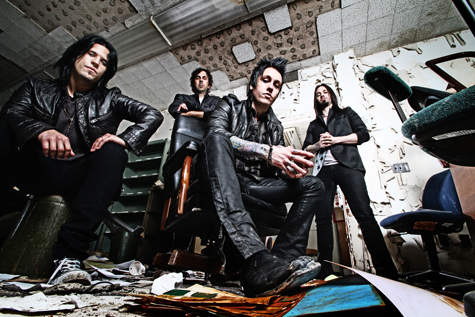
Music Junkie
Papa Roach’s Jacoby Shaddix is addicted to bringing the rock
Love ‘em or hate ‘em, there is no denying that Papa Roach has earned their rank as one of the most successful bands to come from the Sacramento region. They’ve sold upwards of 10 million records worldwide, have toured the globe for over a decade playing venues packed with adoring fans and have truly lived the rock ‘n’ roll lifestyle. But for every high point, there’s been a low. Be it battles with their record label or battles within the band itself, Papa Roach has shed its fair share of blood, sweat and tears, most notably when they parted ways with long-time drummer Dave Buckner in 2008. It wasn’t a smooth split. Buckner, who in the early ‘90s co-founded the band with vocalist Jacoby Shaddix, filed suit against the band saying that they owed him money. They ultimately settled out of court. Papa Roach has since continued on with new drummer Tony Palermo of the San Diego rock group Unwritten Law.
Through all the ups and downs, there have been a number of things keeping P-Roach pushing ahead, Shaddix explained during a recent interview with Submerge. “I would say our relationship with our fan base, the kids that are coming out to the shows being affected by the music,” he said. “We’ve just got that drive inside of us as a band. We’ve got this heart that just fucking pops. It’s all we got and it’s all we need. We all are living this dream, which sometimes can seem like a nightmare, but I’d sound like a bitch if I were to complain. We just love it.”
As for the incalculable hardships that always seem to creep their way into the picture, Shaddix said that after a career like theirs, he and his crew are ready to take on anything. “It’s always a challenge. You’re always up against a challenge,” he said. “But the members of this band are always up for it. I think it makes it easier for us as time goes by too because we’ve just seen so many genres come and go and so many trends come and go.” He chuckles. “We almost came and went.”
In the following interview, we chat with Shaddix about his band’s deep Sacramento roots, how making music is like a drug, their plans for a new full-length record and more. Be sure to catch Papa Roach live in Sacramento for their first time in years when they headline Ace of Spades two nights in a row on Feb. 25 and 26, 2011.
What are some of the first thoughts that come to mind when you think back to Papa Roach’s humble beginnings when you were gigging in and around Sacramento all of the time? Do you ever trip out on how far you’ve come?
For me it’s a daily kind of realization, more so when I’m home around the people that I was with. Not only am I with my band on the road, but then it’s like we’ve got sound guys and light guys, a whole crew, you know? I never had that back in the day. Then I come home, and I’m back around my wife. She’s been with me since I had Papa Roach in the very beginning. We’re old school. We go through our old photos, and we see pictures of me and my wife and my band from way back in the day. My band was in my wedding way back. It’s a trip, you know, especially when I come back home.
I used to go watch you guys in the late ‘90s at this little club near where I grew up, the Gaslighter Theater in Gilroy, Calif. Do you remember that place? That was right on the brink of when you guys were getting the major label deal and whatnot I think.
Fuck yeah, dude! That was a really cool time for P-Roach.
I tripped out when talking to Eric Rushing, longtime Sacramento music enthusiast and promoter, the other day about that era of P-Roach because he was like, “Yeah those were my shows even down there. I was at most of those shows!”
Yeah for these upcoming shows that we’re doing in Sacramento, just to interject on that point, it’s kind of a full circle for us 10 years later. Eric and Brett [Bair] have been very successful. Brett used to manage Papa Roach; we split the sheets, we’re still OK, and we’re friends and such. But it’s cool to see that people who started in Sacramento are all still around here killing it. That’s even kind of why we wanted to put the type of bill together that we put together.
Yeah that’s cool. It’s all Sacramento cred-bands.
Yeah, bring it on home!
So the first night it’s Track Fighter, Will Haven and you guys. The second night it’s Lonely Kings, MC Rut and you guys. So many good Sacramento-based bands! I’m especially digging MC Rut lately. They’ve got a crazy work ethic. Are you familiar?
Fuck yeah, dude. That record is one of my favorites. I mean you’ve got to work hard in this business no matter what. If you want to make it, you’ve got to go in and slug it out in the trenches and build a fan base by playing rock shows. That’s the proving ground for rock music is touring. If you come with a hot song for a minute, that’s all good, but can you go out and tour and pack houses and rock audiences throughout America? Not just like San Francisco and New York, I’m talking, like America, you know what I mean?
Bringing it back to Sacramento for a second, don’t you guys own a studio space downtown? What’s that space all about?
Yeah right now it’s just pretty much essentially a demo studio for Papa Roach, and we’ll have some bands go in there. Like Dance Gavin Dance is going in a few days. They’ll be in there making some noise. Michael Rosen, he used to run out of J Street Recorders, Brian Wheat’s studio, he’s been bringing down some of his gear. He’s got really good gear, and he’s pretty much running it like a proper studio at times with bands. So that’s cool as well. We just don’t want it to collect dust while we’re out on the road.
Must be nice to just to get new riffs and song ideas recorded fast?
Yeah, exactly. I just got a new jam from Tobin [Esperance, bass] today actually. He programmed it on his computer, did the beats himself. There’s no guitar on it yet. It’s just keyboard sounds right now, but it’s like Papa Roach meets…I don’t know, it’s real good though.
So it’s sounding like there’s going to be another full-length ready for release sometime when? Next year?
Pretty much what we’re doing is this, Doomsday Radio, 2012, Papa Roach.
Oh really? I didn’t see that anywhere in any of my research! Is that a working title?
Yup. Working title, Doomsday Radio. There you go, print it.
Throughout the years Papa Roach has morphed quite a bit musically; it always seems like you’re progressing your sound. Can you talk a little about the many phases of your band?
I think for us it’s always been, “Go where the music takes us.” That’s the goal with Papa Roach: If it moves us, we think it will move our fans, and sometimes that’s true and sometimes it’s not. I think more times than not it has moved our fans. That progression that you speak of, we’re still in it. The track that Tobin just sent me, I was like, “Oh shit here we going again, we’re flippin’ it up.” But I’m into it, man. Music is this drug, and you want to try all different types of them. It’s like sex, you know, it’s like you do it the same way over and over and it just gets boring, so you’ve got to flip it up, put a wig on her, hit it doggy style. Switch it up.
What sort of vibe does the new song that Tobin sent you have? I read somewhere that Jerry [Horton, guitar] said the new record will have more electronic elements or something like that?
Oh yeah, for sure. It’s like somewhere between Prodigy meets Nine Inch Nails meets Papa Roach. It’s still got our sound to it, though, like when you hear the groove and the vibe, it’s still us, it’s just sometimes we want to use that texture in the music. I think we started to dabble in it with songs like “Burn” and “Kick in the Teeth” [off of 2010’s Time for Annihilation…On the Record and On the Road]. I think that it’s fun and our fans are receptive to it, and we like it because it opens up a whole new floodgate for us. I think it can make our music more beat-driven at times, which will be fun.
What’s one big goal of yours for the next record?
I don’t want to make a record that sounds like I’m a 35-year-old man, because I am a 35-year-old man, or I’m going to be, but I’m an exciting motherfucker when it comes to making music. I don’t want to make music that sounds compromised. That’s the goal for the next record is to kind of–and we’ve discussed this together–is to make a record that’s a little bit more experimental at times and a little bit more progressive. The last couple records have been song, song, song, etc. If you look back at one of our first releases, Old Friends from Young Years, there was a whole concept behind the way the record was laid out. I think we want to do something like that again.
Like as far as flow and transition tracks and whatnot?
Exactly, just to kind of dig deeper and make it more of an experience this time around. Not really a concept record, but something that is more than just song, song, song, song.
Even to the way that we’re going to do music videos in the future and the way that the band is imaged as well. For us, it’s a goal to kind of evolve all elements of what we do just a bit.
You might be getting older, but I sense that you are just as hungry as ever to succeed.
Yeah, look at the Chili Peppers. You don’t think of it that way. You think it’s just timeless. That’s what we’re going for. We’ve got a long, long road ahead of us. This is just another step in the path for us.
Papa Roach has heavy staying power in the music business, doesn’t it? It’s been so many years, but you guys remain relevant.
We definitely don’t take that shit for granted. But the fight is not over, dude. You look at a band like Green Day, they made that record, you know what I’m saying? For us, we still feel like we have that record in us. We still feel like we haven’t made the record of our career. Maybe it’s just that junkie inside me.
Papa Roach will play live in Sacramento for the first time in years at Ace of Spades (1417 R Street) on Feb. 25 and 26, 2011. Tickets are available at Dimple Records, The Beat, Armadillo (in Davis) and online at aceofspadessac.com. Grab their latest album, Time for Annihilation…On the Record and On the Road, a collection of nine live renditions of P-Roach hits and five newly recorded tracks, at record stores everywhere or through any major online retailer.
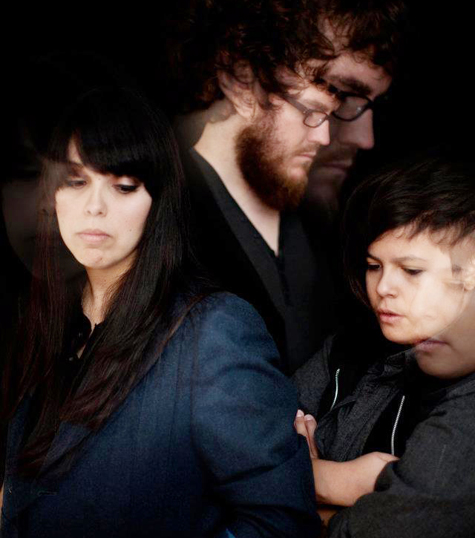
Picture Perfect
Sister Crayon Steps It Up Further on Debut LP
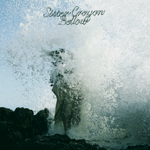 It was a gray and windy afternoon on the beaches of Malibu. A tidal wave warning was in effect, but there local band Sister Crayon stood, fully-clothed, sharp shoreline rock at their ankles, as photographer Eliot Lee Hazel barked orders to capture the frozen chaos of crashing white caps for the band’s debut album art.
It was a gray and windy afternoon on the beaches of Malibu. A tidal wave warning was in effect, but there local band Sister Crayon stood, fully-clothed, sharp shoreline rock at their ankles, as photographer Eliot Lee Hazel barked orders to capture the frozen chaos of crashing white caps for the band’s debut album art.
Lead singer Terra Lopez slipped during one shot, cutting her leg, but Hazel ran his shoot like a drill sergeant. “He just said, ‘Get up. Don’t smile. Don’t look at me,’” Lopez said. “Well, he’s a sweetheart, nice guy, you can sit down and talk to him, but when he’s taking photos he is so intense.”
As absurd as it feels to the members of Sister Crayon, Lopez and drummer Nicholas Suhr spoke of the shoot as one of their most memorable music experiences–even though it had little to do with music. Along with Hazel’s artwork, the band has a high-def music video done by celebrity photographer Robert Ascroft. Browsing both photographers’ websites, perusing the tastefully gratuitous images of Devendra Banhart, Usher, Mariah Carey, Edward Sharpe and Brad Pitt, Sister Crayon will be the first to tell you how privileged, yet out of place they feel. Are these the last remaining minor moments of Sister Crayon before they receive Coachella bookings and Japan tour offers?
In the next few weeks, the band is playing humbler venues like Townhouse for the Sacramento Electronic Music Festival and Luigi’s Fungarden for the Bellow album release party. So our indie darlings have yet to grow too big for our sleepy city. Lopez looks like a siren Viking vixen in the video for “(In) Reverse,” but when I met with her and Suhr at Mondo Bizarro (formerly Butch & Nellie’s) for an interview, she was back in her Midtown garb, a second-hand green army jacket and jeans–the Lindsay Weir of Freaks and Geeks look. She’s still the same shy songwriter, fronting a gloomy pop act that seeks inspiration in the lonesome despair of poets like Jean Genet and Fernando Pessoa.
The Bellow sessions scattered across the span of a year and a half. The newly realized lineup of Sister Crayon crammed in 18-hour shifts at The Hangar with engineer Scott McShane, who described the process as “tense” and a “guerilla recording style.” McShane produced the first Sister Crayon EP, Enter Into Holy (Or)ders, and the band never entertained the thought of working with anyone else. “Recording already is a really intimate thing. We bond so well with him. He gets what we’re trying to do, even before we understand it,” Lopez said.
“He’s able to throw out ideas that’s not in an insulting way. It’s just full-on experimenting and you know that it’s for the best. He pushes us to succeed,” Suhr added.
The tension came from the hourglass pressure of paying for studio time and the unfamiliarity of having a new drummer join two weeks prior, writing his parts on the fly. Suhr was not a complete stranger, knowing Lopez from her stint in The Evening Episode, but he and Lopez talked of the anxieties surrounding a debut full length. “We were zombies. We’d spend 18 hours in the studio and you can hear it in the record,” she said.
Originally, Bellows was intended to be a five-song EP, written by Lopez and synth-keyboardist Dani Fernandez, with “I’m Still the Same Person” being the only pre-released song to make the album. But once the band wrapped recording those five songs, creativity was running high and five more songs were written collectively. “Scott kept telling us there was a lot of tension on the record,” Suhr said. “If you know what was going on at the time it makes sense. There was a lot of time spent coming to an agreement on things, but whenever we’re writing together there’s no awkwardness. It was easy to go into the next five songs with an open mindset.”
Indeed, the settling in is brazen and culminates with a spacious piano ballad called “Ixchel, The Lady Rainbow,” in which Lopez’s visceral croon soars over a piece written by former member Genaro Ulloa. “Ixchel” was the last song the band recorded, a one-take recording done well past the midnight hour. “We did it live tracking,” Lopez said. “He was in the other room and I was in the main room singing. We could see each other through a little window, but that was it. It was the first take and it was incredible. I know it sounds corny, but there were tears in everyone’s eyes. We were all exhausted. Even Scott had tears in his eyes.”
Suhr added, “It’s one of those songs. Every other song on the record we did multiple takes because we felt we could do better. At the end of that song, everyone was just like what the fuck. It’s one of those songs where if it didn’t sound like that, with the imperfections left in, it wouldn’t have worked.”
The gloomy pop instrumentation informed by the troubled words of dead poets is an appropriate setting for an album titled Bellow, but Suhr said a lot of the mood is owed to McShane’s guidance. “I heard the five songs written before I joined, but the mood had changed through Scott’s ears.” Lopez said his touch is most prevalent on “Here We Never Die and “(In) Reverse” as he took the band’s ideas and focused them into a cohesive sound.
In addition to McShane, the Sister Crayon sound, most notably the lyrics, is in homage to the writings of Fernando Pessoa, a 20th Century poet and literary critic. Lopez only admitted her obsession with Pessoa’s work. She has a Pessoa tattoo and her Pug’s name is Ophelia, after Pessoa’s secret crush to whom he never confessed his love. “It’s the despair,” she said. “It sounds dramatic, but he was such a lonely individual. He was very mysterious and obviously people are drawn to that.
“I think that is a huge part of Bellow. ‘Here We Never Die’ is my talking to a lover in that way. The despair and sadness that he wrote is so sad that I can’t even finish one of his books. I have to read a sentence a day sometimes because it’s so much. It just floors me. I have no option when it comes to his presence in my music.”
As intense as Sister Crayon is sonically and visually portrayed, Hazel’s insistency that the band stop smiling as the chilly Pacific waves capsized on their heads speaks of the band’s unbridled joy in its work. As arresting as “Ixchel, The Lady Rainbow” is, Bellow closes with “Souls of Gold,” a cheery campfire sing-a-long with a blasting brass section and woozy synths. “We’re always such a serious band and a lot of our songs are really dark,” Lopez said. “I do like that the album ends on a lighter note than what it could have been.”
See Sister Crayon live at their release party for their new album Bellows at Luigi’s Fungarden on Feb. 19.
An Arbor of Love
Cake’s Showroom of Compassion feels for you
Words by Adam Saake | Photo by Robert Knight
Longevity in the music industry has long been an admirable quality when we discuss a band and their merits. Not every musician can be Bob Dylan and few bands can be The Rolling Stones, who just won’t seem to go away. Flashes in the pan are the vast majority and that’s if you’re lucky. At least you have some good stories of what it was like, and maybe, if you had a catchy single, an immortal slot on the alternative radio rotation. The rock star talent that Sacramento has produced (yes, I’m listing them again)–Deftones, Tesla, Jackie Greene and even Far who managed a comeback–have all had pretty steady careers throughout the years. They all continue to put out records, tour on a regular basis and find support in a market that perpetually seems on the verge of collapse. Nobody buys music anymore, right? Cake’s John McCrea has his fingers crossed that that’s not the case.
“Hopefully there’s a few people left that think it’s OK to buy an album at this point,” quips McCrea.
With the upcoming release of their sixth studio album, Showroom of Compassion, slated to hit stores in mid-January, Cake has found a place that the band can find comfort in. Not because after 20 years of being a band they’re set for life, but because they’ve continued to push forward and do what’s right for them; major label support or not.
“Because of the instability of the music business, we had to reinvent what we wanted to do,” says McCrea. “We were able to extricate ourselves from the record label and start our own label.”
Part of this new venture was taking their time recording and engineering the new record, which they did entirely themselves in their Midtown studio.
“We took an old house and hollowed it out and put in microphones and solar panels on the roof,” says McCrea.
Showroom of Compassion, which was a “100-percent solar-powered recording process,” is Cake sounding as good as they ever have. They’ve always been a no-bullshit kind of band that hardly entertains with bells and whistles. Well, unless it’s actual bells and whistles or rattles or keyboards or whatever else the band deems lo-fi enough to make the cut. Songs on the new record are typical of their sound: minimal yet sonically engrossing with lyrics that leave you pondering their meaning. The grit is there, as always, but knowing how much time and personal attention went in to the songs makes the album seem so much more special.
McCrea joined Submerge via telephone from his home in Oakland, where he lives while the band isn’t recording in Sacramento.
Your press release says that you and the band had much more to do with the recording and engineering of the new record. What was the best thing that came out of that experience, besides a great new record?
I think it took forever doing it that way. We’ve always produced our own albums ourselves, which takes a long time. But also, we’ve increasingly been turning the knobs ourselves. I think we might be getting better at producing, which is hopefully the case. The best thing to come out of it is a sense of ownership and a sense of responsibility for what we’ve done. We don’t feel like anyone’s handed us anything. We never have. Even when we went to studios we were very hands-on. I guess early on we didn’t find people who really understood what we wanted to do, because what we wanted to do was very antithetical to what was going on at the time in the mid-‘90s when there was a lot of grunge. The production values were
very bombastic.
It seems like not a lot of people would want to take a chance with that because if they felt it wasn’t going to be successful then they wouldn’t touch it.
Certainly that was the case with record companies but also with producers. We didn’t know of a producer that was doing anything similar to what we wanted to do. In other words, no one was crazy enough to make stuff sound dinky. You know, during a period when everything was sounding very grandiose. We really thought that in a country like the United States, how rebellious is it to sound “big?” How subversive is creating the aural equivalent of deforestation? In a lot of ways it seemed like business as usual. So we thought, in the United States, to turn the volume down would probably be more scary and more subversive than turning it up. Not to say that all music that’s loud is bad; it’s just that we were tired of it at that point. It seemed like people were getting louder and louder. We freaked people out by turning the volume down. People used to yell at us to turn it up.
I see that you, Vincent [DiFiore] and Xan [McCurdy] all played keyboard or synthesizer on Showroom of Compassion. Was it very intentional to incorporate more of that sound into the songs?
Um…well I did allow something on this album that I hadn’t allowed ever before, which was acoustic piano. I always avoided it, because I thought it sounded too classy for us. There’s something really classy about acoustic piano, and I thought that’s not what we’re really about. But with this album, I found this old junker up in Portland [Ore.] and shipped it down here. I think it sounds crappy enough to be on our album, and it doesn’t sound like the good life or anything. As far as the other keyboards, the Nord and other stuff, we used quite a bit of keyboard on Pressure Chief–actually more, maybe, than this album. But certainly we used more keyboard on this album than we did on, say, our first album or our second album.
Over the past two-and-a-half years of writing the record, really taking your time, have you discovered that you like a slower pace of writing?
It wasn’t the writing that took a long time, it was the recording process that took a long time. We reconfigured our studio and put solar panels on the roof. We also did the same thing with reinventing our business from the ground up. We had to set up channels of distribution. We had to ask ourselves, what’s going to work now? Certainly we realized that the major-label music business structure wasn’t right for us. For one thing, it’s too expensive. If a really good percentage of people have decided that recorded music should be free, it’s no longer sustainable to have a bunch of record company suits eating out every night on our dime. We wanted to get ourselves away from that. I think we had to re-evaluate and take some time off to think and decide how we wanted to do it and whether there were still enough people to support us. The sales for recorded music have declined precipitously in the last 10 years. We wanted to economize and make sure that we could still pay our bills. By having our own record label, it helped quite a bit. Five or 10 years from now, who knows? There might be a whole different system. It would be nice if there was a different system–a way for musicians to have health insurance.
You’re an outspoken guy when it comes to issues that are important to you, yet your lyrics don’t seem too over the top. Is there a method to your madness when you sit down to write lyrics?
I don’t really sit down to write lyrics. I’m sort of writing lyrics all the time. I’ve had this notebook in my back pocket since I was a kid. I just sort of take notes about things that I find interesting or disturbing or upsetting. Then eventually I sit down and put all these little pieces of paper into songs and that’s my process. I wouldn’t say there’s that much singular intentionality to it. I think it’s a lot of different agendas I have. I do try not to be overly obvious with the songwriting. I describe the way things feel or smell or look rather than telling people exactly what I think. I think also there’s something to be said for a song being somewhat multi-purpose. For instance the song “Sick of You” I think can be looked at more specifically to be about a relationship between two people and it can also, I think, in a broader way be about general societal mood nowadays.
You guys have been known to play secret shows here and there. I know there’s been a few at the Blue Lamp, Old Ironsides and I remember some at the old Capitol Garage too. Is that something that you do for the Sacramento fans? Is it to warm up a new live set before you hit bigger venues? Both?
Yeah, it serves both purposes. It’s hard to figure out what you want to do live without actually playing live. It’s also a thank you to Sacramento for supporting us all these years. And it’s also for our listeners who have signed our mailing list, because without a record company we really depend on the direct connection to our listeners. If it’s the only way for people to find out about those shows by signing the mailing list, then I think it’s a good incentive. It’s a good way for us to stay in touch with people and a good reason for people to want us to stay in touch with them.
When did the whole idea of giving away trees at your shows, the Cake Forest, begin and what prompted that?
I planted a tree in Sacramento in front of one of my apartments where I lived a long time ago. I put it in the median between the sidewalk and the street. It was about as tall as my chest, I imagine. Things happened in my life, I moved away and the band started doing well, and I started being away from home all the time. I forgot about the tree.
Years passed and I went back to it and, oh my god, it was way up there. It’s a profound physical reiteration of the passage of time. That’s really what trees are all about. And I just thought; wow this was a great experience that I had. Being able to plant a tree and come back years later to see what was going on with it. I thought, everybody should have that experience. Everybody should try to plant at least one tree in their whole life. As the tree gets bigger and stronger, you get older and die. I thought, wow we could make a deal with people that if we give them the tree they have to send photographs of themselves standing next to the trees and keep us posted on how the tree’s doing. Even if it dies, people are supposed to send us a photograph and we put it up on our site.
Have you gotten a lot flack for using Cake’s website as a place to educate and discuss the global and local issues that are important to you and the band?
Oh yeah. It’s almost not even worth it to say anything on our website anymore. People just freak out! I feel like some people must be paid operatives from the Heritage Foundation or something. Just freaking out. I think they want to shut us down. I don’t find websites of bands very interesting. I think it’s kind of unhealthy just to focus only on the people and the band. I think it’s better to talk about subjects. Our music is about subjects, and I feel like we shouldn’t be barred from discussing subjects on our website.
Cake’s Showroom of Compassion will be in stores Jan. 11, 2011. If you do still buy albums, this will be a good one for you to get. If you’d like to sign up for Cake’s e-mail newsletter, go to www.cakemusic.com/news and click the link on the top left of the page.
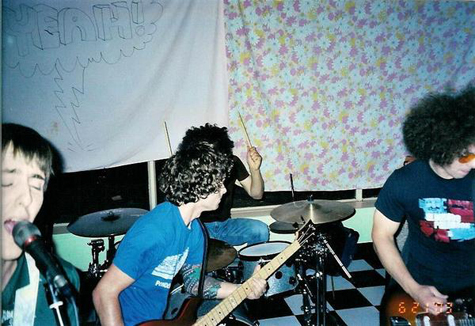
Celebrate The Music
Beloved Sacramento band Mister Metaphor to reunite for one night
Bands form and break up all the time; it’s what they do. What’s extremely rare, though, is for a band to become more popular after they’ve broken up, to gain hype without even playing shows, with no self-promotion whatsoever. Such is the case with Mister Metaphor, a Sacramento-based four-piece post-punk/experimental group who had a good, albeit rather brief, run back in the early to mid-‘00s. In order the achieve this sort of post-break-up popularity, one thing is for certain: the music has got to be really, really good to withstand the test of time, to remain relevant throughout the years and to not get lost in one’s CD booklet or erased from one’s iPod. Mister Metaphor’s music had all the ingredients: It was technical and highly skilled, but not so much as to make your head hurt counting time signatures; it was fast and high-energy, but not enough to scare people away; it was melodic and memorable, but not too pop-y or sugarcoated to make you want to vomit when the chorus came around. Their music had a little something for everyone, and it struck a chord with those who were lucky enough to discover the band, whether during their time together or after the fact.
Mike Sparks, Mister Metaphor’s co-guitarist/lead vocalist (who later went on to form the band Bridges, which ultimately became By Sunlight) knows first-hand the capability of good music to spread. “As the years have passed, especially the last three with all the touring that By Sunlight has done, one out of every two shows we‘ve ever played on tour some kid has come up to me and said, ‘Are you the guy from Mister Metaphor?’” Sparks admitted to Submerge during a recent interview. “For a lot of people during that time frame, it just sort of got to them. It was what they wanted to hear.”
Justin Goings, Mister Metaphor’s drummer (who has played in a slew of credible bands with regional ties including Playing to the Grandstand, O! the Joy and Jeepster), has had a very similar experience since they disbanded. “I’ve talked to so many people that have said, ‘Man, I never got to see that band and that’s one of my favorite bands,’ and I’m always like, ‘Wow!’ I’ve met so many people like that after the fact,” Goings said. Again, all of this is rather surprising considering that Mister Metaphor was only a band for about three years, played less than a hundred shows and put out two EPs, only one of which ever saw a proper release (Die on the High Road, released on Omnibus Records). “It was really brief,” Goings said of the lifespan of the band. “It went by really quickly. It was like going down a chute or something, and I got spit out the other end and I was like, ‘That’s it?’”
Turns out, that wasn’t it. Earlier this year, Francis Eastman, a good friend of the band and member of Oakland’s Echo Location, proposed to Sparks that Mister Metaphor should reunite for one last performance. “It was the end of the night after some show, and me and Frank were a little drunk and we were sitting out on his front porch,” remembered Sparks. “Basically, he asked that because he was turning 30 this year he wanted to have a Mister Metaphor reunion show.” Sparks agreed, contacted the other members and it was eventually set in stone: Mister Metaphor would reunite for one show on Nov. 6 at Townhouse Lounge in Sacramento. But who was this Eastman guy and how did he have enough clout over the band to coax them into reuniting after all these years? Surely the members of Mister Metaphor had been bombarded with random requests to reunite many times before, so why now?
“He paid for our last EP,” Sparks admitted with a chuckle. “He paid for it outright. It actually got recorded about a year or maybe even two after we were broken up.”
A-ha! Now it makes sense why Mister Metaphor owed it to Eastman. He had done them a huge favor years before by funding a trip to The Hangar to work with engineer Robert Cheek to bust out five songs they had written but never captured on record. Doing this show was a simple matter of paying Eastman back then, right? Wrong. It’s deeper than that. “It was a little bit more than that,” remembered Sparks. “He’s a really good friend of ours. And honestly yeah, fuck; we do owe it to him. But it just felt kind of right. We never really had a farewell show or anything. The band just disintegrated really, really rapidly.” Sparks recalled that they had attempted to do one final show after recording the Eastman-funded EP (which never was officially named nor released, it was only available online for free download via the band’s now-defunct website), but that it never worked out.
This time felt different. “It just felt like a good thing,” Sparks said. “Of course he instigated it, but I think all of us had this weird lack of closure or something. We never got to just stand there one time and go, ‘OK, here we are.’”
Thanks to Eastman, whom Goings even described as “somewhat of a fifth member,” that chance is finally upon the members of Mister Metaphor. They finally will get to stand on a stage and pay respect to each other, to their supporters, to the music and especially to Eastman. “This whole thing is happening because of him,” Goings said. Since it seemed like Eastman was such a pivotal part to this story, we contacted him to ask what it is about Mister Metaphor that he loves so much. “At this point, the band reminds me of a period of my life that cannot be replicated,” he said. “The original Capitol Garage always had rad shows. The local scene was putting out amazing music, and we were all sharing an apartment and doing stupid shit in our early twenties.” Everyone can appreciate that. Hearing certain bands can take you to a different time and place. Good friends, good music, good times: the recipe to so many of our upbringings.
“I feel like the big thing beyond basically saying thank you to Frank for paying for our record is I don’t feel like we ever got a chance to thank everybody who was enthusiastic about the band,” shared Sparks as our conversation came to a close. “It’s going to be an emotional night. There were a lot of feelings invested in this band, and I can’t wait to get all that energy in one room. It’s going to feel good to celebrate that band the way it deserves.”

Sound Off!
Nic Offer of !!! Talks About The Weather
Creative people come in all kinds. The creative environment that works for you may not work for me. Maybe you need seclusion, a familiar place, peace and quiet, or maybe you require a Scarface-size mountain of coke and a room full of half-dressed, semi-conscious admirers strewn about the floor to craft your magnum opus. Hey, whatever works, right? For their latest album, New York by way of Sacramento band !!! literally traversed the globe, committing its latest batch of songs to tape. Strange Weather, Isn’t It?, the band’s fourth album, was recorded in New York, Berlin and even right here at the Hangar in Sacramento. Frontman Nic Offer admits that though it may sound exciting this probably isn’t the most economic way to work.
“It’s not always the best way to do things, but it’s kind of the way we ended up,” he says. “We’re living in four or five different towns with the majority of people in New York. We can’t just make everyone come to New York, so we pick some place to meet up.”
Location-jumping in order to get work done isn’t new for the group. Offer says the band has met up to practice in a variety of different places, such as Seattle, even though no one in the band resides there.
Berlin, however far off it may seem from the River City or even the Big Apple, was not an entirely random choice. The band’s now-former bassist Tyler Pope called the German capital home. Even more so, Offer says that the decision to record in Berlin was a creative one. In !!!’s most recent bio, the frontman is quoted as saying “Everyone’s got a Berlin record in them, and I guess we just wanted to see what ours would sound like.” However, in our interview, he mentions that the remark was meant to be taken lightheartedly.
“It was really just a joke,” he says. “Anyone can just go there and do it. Everyone’s got a Sacramento record in them, you know?”
Jokes aside, Offer explains that recording in Berlin did have a certain draw to it.
“There’s just that whole mystique of a Berlin record,” he goes on to say. “It was just an experiment to see what we would make, to see if it would affect the record. It was just an experiment, which I think is important when you’re writing, to just try different things.”
If hopping continents to record the album weren’t enough, !!! also underwent a series of lineup changes around the time Strange Weather… was written and recorded. Pope exited while the album was being recorded; meanwhile, John Pugh and Justin Vandervolgen departed before writing began (compounding the tragic death of drummer Jerry Fuchs in November 2009). All of these changes mean a very different !!!, and it shows in the music. In the following interview, Offer talks about his creative process, recording Strange Weather…, hanging out in Berlin and his signature dance move.
Are you guys into a lot of the Krautrock stuff?
When we first started the band, it was right when we were getting into Can, and we heard how they would jam for 14 hours a day in some castle in Germany, and that just seemed completely unreal to us. Now, with the change of technology, we can jam for hours. We couldn’t afford to buy that much tape and hire somebody for that, but now with computers, you can jam as long as you can stay awake and not have to stop it. And there we were in Germany with the opportunity. It was like living the dream, to be there and have nothing else to do but jam.
It’s interesting to hear you say that you did a lot of jamming when writing this record, because the album is very tight. There is almost a pop-y feel to it. Did that come out of the jamming process?
There are songs on there that are from hour-long jams that we could have [written] a whole other song out of. It’s like we would jam, record it all, then make loops of the best bits, put them next to each other and listen to them together to see where people got the most excited. Lots of things we had to let go come back in later songs down the line or something. It’s a big process of narrowing down that got it down to something so pop.
Was there an inclination to make more sprawling songs? When did you feel it going in a tighter direction?
It was really a conversation I had with my friend Margo. She was complaining about how our songs were too long and jam-y. At the time, the conversation kind of hurt my feelings a bit, but I just kept hearing her voice in my head as we finished the record. If anything, you just want to make something your friends like. If your friends are listening to it, not just because they’re your friends, but because they like it, then that’s a really high compliment. That’s something we’re always shooting for. We’re shooting to make Margo happy.
So she’s sort of like a member of the band?
Yeah, she’s our executive producer.
Was that something you were feeling at all–that your songs were too long, and when she said it, it kind of backed up what you were thinking?
No, actually, that was the thing. When you get criticism, sometimes it’s like you kind of did already know it and didn’t admit it to yourself. You’ll hear it and say, “Actually, that is kind of right.” When you don’t agree with it, it’s good because it makes you work harder to get your point across. It’s like, “That’s not working for people. This is exciting me. How can I make what excites me work for other people?” It just makes you hone it better. That’s one of the really good things about criticism. My advice to any musician would be to learn how to take criticism and find someone who can criticize you well and that you trust. That’s important too, because some people just talk out of their ass, and you don’t need to listen to them. To have a really good friend who you know you can play something for and they’ll tell you the truth is really helpful as a songwriter.
When you were recording out in Berlin, did you spend a lot of time in the clubs?
We tried to as much as we could. You have to keep it together and not get too wasted so you can do something worthwhile the next day. We were going out as much as we could, really–or some of us would. Some of us went out more than others.
Did what you hear in the clubs play into what you were jamming on in the studio?
Yeah, for sure. It’s a really good way to work, when you’re working all day, and then you go out to the clubs and hear the kind of things that you were working on and how they’re working live, and how they’re affecting people. It makes you pay attention to things differently.
During the making of this record, you had a few band members leave–two before and one during–how did that affect how you guys worked?
It was kind of something we rolled with. It was an unlucky break when Justin left, because he produced the last record. He really played referee between a lot of our fights and really understood us. He was in the band, so he understood where we were coming from and where we needed to be pushed. He had a technical head that a lot of us didn’t, but we just brought in another producer. You try to use what you’re given to work with. We tried to use the advantages of having a fresh producer to get a different sound. That’s all you can do. You make the record from where you’re at instead of lamenting where you were.
Did you enjoy having someone outside the group, Eric Broucek, produce this album?
Yeah. Sometimes it was a bit difficult, and sometimes it felt like he was a little too outside the group and coming from a different perspective, but listening to the record now, after all the fights are done, I think he did some really good stuff on it.
Was there combat between you and Eric?
Yeah, but there’s push and pull between everyone. It’s like he just becomes a member of the band eventually. He’s just becomes another person to fight with [laughs].
Is the fighting an important part of your creative process?
Uh…yeah. I wish it wasn’t. I don’t want to say that it’s the ultimate creative tool and that all bands should fight each other to make a record, but I think if you can learn from the fighting and learn how to fight better so you’re not hurting each other’s feelings and saying what needs to be said. If you’re letting the record be made, and you’re not criticizing it, and you’re not saying what needs to be said, the things you’re afraid to say to your band mates, they’re going to read in the press anyway, so you might as well say them now. I do believe fighting can be a powerful creative tool.
Getting ready for this interview, I saw a lot of videos of you on YouTube just losing it on stage. Do you have a go-to dance move? I noticed the one where you have your arms down at your sides and you kind of shimmy, I guess.
Yeah, I’ll have a lot of people come up to me after the show and say that they can do my dance, and they’ll bust into that one. That seems to be the one that people have glommed onto the most. People from all over the place, unconnected, would call it “The Penguin.” That works for me. That’s cool.
New-ish Beginnings
The New Humans’ Avalanche Drops, Finally
Words by Vincent Girimonte | Photo by Raoul Ortega
Don’t broach the time before The New Humans with The New Humans; it’s akin to rehashing a saga and you’ve missed the first couple of installments where some real heavy shit went down. Sitting in front of Temple Coffee on 10th, that savory little nook of downtown Sacramento that feels like a downtown, Cole Cuchna and “new” singer Scott Simpson gingerly sidestep their previous selves as if they were officers in some cult; Simpson speaks briefly on his days with Sacramento rock outfit Still Life Projector while Cuchna is less forthcoming.
“I’m going to drop [Cuchna] out right now too–Cole was in a band called Red Top Road that was kind of big around the same time,” says Simpson. Once you’ve jumped from the ‘burbs, all that noise must be like Calvin Klein to Mark Wahlberg.
But nobody likes the then, especially when the now has finally shown up. The New Humans release their first EP, Avalanche, Aug. 21 with a Korg shakedown of sorts at The Townhouse, supported by Dusty Brown side project Little Foxes and those plucky FAVORS kids making their live debut. And yes, this is The New Humans’ first EP, which is no doubt a little surprising given the all the buzz The New Humans have created over the past few years, playing as an instrumental band nonetheless.
“It was never planned,” says Cuchna of the band’s instrumental phase. “We always thought the songs sounded incomplete. It was never really what we wanted to do.” Simpson took over the vocals after an arduous search for that elusive frontman, futile as they often seem to be. “We got tired of it. Trying out a bunch of people, no one was really going to grasp what we were going for besides one of us,” Simpson admits, though the group maintains that perhaps it was for the better.
The New Humans were conceived on a laptop, initially with a fairly direct “screw the guitar” mentality stemming from their previous ventures. Simpson and Cuchna, childhood friends from their days growing up in Elk Grove, wrote dozens of songs before picking up bassist Robert LaCasse and later adding current drummer, Mike Steez.
“When we started we were a lot more excited about it. I almost forget about it now,” recalls Cuchna. “Our intention was never to be like, ‘Oh check out this band, they don’t have guitars.’ I guess that would be one cool thing about us now.”
No guitars in today’s Midtown doesn’t turn any heads. It’s not uncommon to see a show with the MPC 1000 or something of the like running things on the floor, people kneeling over it awkwardly like some Ouija board. The New Humans occupy a very different side of this trend, though. Sugary, glam-y, coked-out even; it’s glitzy–not janky–in the way K Street is trying to be. “Fever” is the punchy single that predates the EP by what seems like eons, but it’s “All the Kids,” the EP’s opener, that does well to outline the album’s general framework: catchy synth melodies, live drums with percussion loops on top and a piano underneath trying to tether it all down.
“[Not having guitars] lets in the stylistic, bluesy or jazzy undertones–there’s a song on the EP with a Latin-y undertone. It lets all that color come through,” says Simpson, the pipes of this sassy “disco generation.” Some opening falsettos belie his trepidation over taking the lead vocals, and I wasn’t the first to mention that his inner diva was beginning to surface.
“I feel like every show we play, it’s coming out a little more, and in another year I’ll be a complete fucking monster.”
If there’s a sense of relief following the completion of any project, The New Humans are the divorcee who finds love again after Dad packs up and leaves. Six months were spent recording in a Sacramento studio (names are omitted per band’s request), and though both parties remain cordial, those six months were scrapped due to artistic disputes and “fake promises.”
“He wanted to produce it, so we were like, ‘OK, produce it,’ not knowing how far the producing would go,” Simpson says. “It’s a lot of trust to put in someone when you’ve never heard anything they’ve produced before. I don’t trust anybody with my band that way, unless maybe you like, produce fucking Radiohead.”
Cuchna adds, “I think that it was probably our fault for not really setting ground rules.”
Cuchna cites differences in process rather than the actual material being recorded; Simpson recollects on an uncomfortable foray into “L.A. bullshit,” where the band was allegedly being pushed into a deal with a sheisty label.
“It was a commercialized process, which could work for us, but it was an over-commercialized process,” says Simpson. “All the bands, they were trying to get them on The Hills, shit like that.”
The group self-produced with some guidance from Ira Skinner, using his studio space essentially for their own devices–“[Skinner] put in advice where we needed it and where we asked for it,” says Simpson. The New Humans purport to be in the “electric piano rock” vein, and though we can’t derive too much from that, the production doesn’t always speak to the band’s live panache–some tracks lack articulation, components grind together, coming up a little short in the “pop” factor that one generally demands with any electronic project under the umbrella of “dance-y.” But it’s their first production, more of a “demo” according to Cuchna, and he stresses the fact that they were past due on getting the EP released.
“That’s my only thing with the EP–it’s kind of all over the place…not all over the place, but we’re kind of treating it more as a demo,” he says. “At this point, we just needed to get the songs out.”
A mini-tour is planned for the fall, hopefully with a label supporting it. At this point the band is eager to get the EP “in the hands of the right people,” whomever they might be. Suffice it to say they’re in no particular hurry.
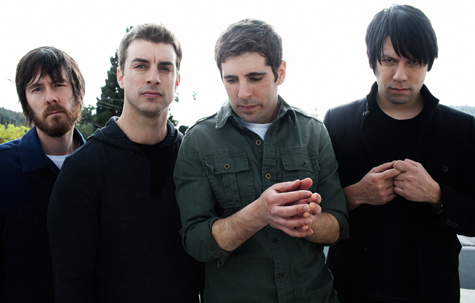
Living Another Day
Far
At Night We Live
(Vagrant)
“Don’t call it a comeback…” Oft-quoted, L.L. Cool J’s assertion that he’s “been here for years” is perfect for occasions such as this. In the mid- to late ‘90s, Far blurred the line between backwards-cap, Addidas-clad nü metal and heart-on-sleeve emo rock, and managed to do so in the most graceful manner possible. Their emotionally potent, fist-pumping (not the Jersey Shore kind) brand of heavy music probably could have had a huge impact on the world outside of Sacramento–it should have. And though Far certainly carved a niche among music fans at large, their 1998 breakup truncated what could have been.
Of course, the members of Far never went anywhere. The band’s name has always been uttered with no small amount of reverence, and its members had no problem moving on to other successful projects: Guitarist Shaun Lopez went on to helm The Revolution Smile, bassist John Gutenberger played with Two Sheds and Jackpot and frontman Jonah Matranga became most notable after Far’s demise for his solo work under the name Onelinedrawing. He even got a good dose of radio airplay when he provided vocals for the Fort Minor (Mike Shinoda of Linkin Park’s side project) single “Where’d You Go.” At Night We Live, set for a May 25, 2010 release, will be Far’s first album in 12 years. Will it make good on the promise they showed over a decade ago, or is it too little too late?
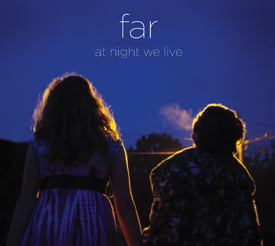
At Night We Live makes a statement toward the former with its huge opening track, “Deafening.” Fittingly, the sound of a timer rattles a few clicks before erupting into a brief battery of powerful riffs. Gutenberger’s sinewy bass lines and drummer Chris Robyn work in perfect symbiosis, powering the verses before giving way to Lopez’s mammoth guitars on the choruses as Matranga wails, “It’s deafening,” as if he’s pointing out the obvious. Later, Gutenberger and Robyn shine again on “Dear Enemy,” a palpitating and circuitous rocker punctuated by a stuttering outro.
It’s not all punch, though, as Far shows that even after a long absence, they’re not afraid to mix it up. Atmospheric tracks “When I Could See” and the sprawling “The Ghost That Kept on Haunting” pull from a much more subtle sonic palette, allowing Matranga’s breathy vocals to take on a sort of dark croon. This creates just enough variety among a collection of songs that sticks to a pretty consistent tone and tempo.
If there were one complaint with At Night We Live, it would be that it’s a bit one note. Songs such as “Give Me a Reason” get lost in the shuffle and are easy to overlook. Also, the final track, “Pony,” the Ginuwine cover that sowed the seeds for Far’s reunion, serves as an anticlimactic conclusion for an album that starts off with such bombast–a clever novelty maybe, but a novelty nonetheless.
Otherwise, there should be more than enough positives here for those who have been waiting with crossed fingers in hopes that another Far album would come. Rest assured that it’s been worth waiting for. But whether or not the band’s shot at a share of the spotlight has come and gone remains to be seen.
Words by James Barone
Click for our interview with Far’s Jonah Matranga and Shaun Lopez [Dec. 2008]

